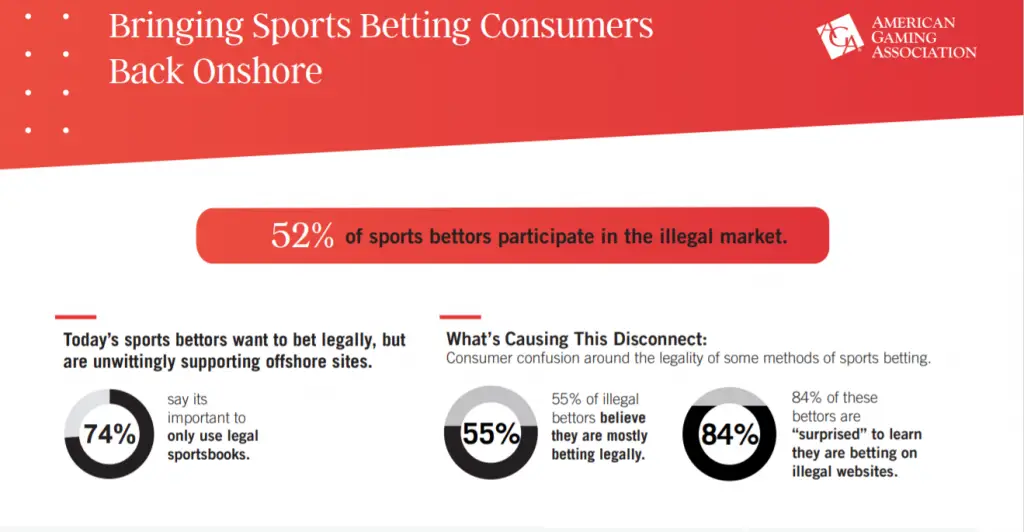AGA Research: Sports Bettors Want To Bet Legally

New research by the American Gaming Association (AGA) points to legality as one of the core issues on bettors’ minds when they choose to place bets.
“Consumers are moving their business away from illegal bookies and toward legal options,” the AGA sports betting research states. “Average spending with illegal bookies fell 25 percent in legal sports betting states last year, while legal online and mobile betting spend increased 12 percent.”
More troublesome for legal operators is the fact that “Illegal offshore operators also saw a three percent increase in states with legal sports betting,” according to the AGA.
The research was conducted between December 2019 and January 2020 by Heart + Mind Strategies on behalf of the AGA. The survey includes 3,451 interviews among American adults over 21-years-old of various subgroups.
Conflation Is the Name of the Game
The rise in legal and offshore sports betting points to offshore sportsbooks benefitting from the exposure sports betting has received since the overturn of PASPA in May 2018.
The same conclusion was put forth by H2 Gambling’s David Henwood at ICE North America in Boston last year.
During a presentation at the ICE NA conference, H2 estimated the illegal market would grow from $10. 4 billion to $11.2 billion as a result of the US exposure of mobile sports betting following the SCOTUS PASPA decision.
The conflation between state-licensed US sports betting operators and unlicensed offshore sites is a thorn in the side of the bourgeoning US industry, with offshores’ marketing campaigns continually cited by mainstream media outlets.
As the AGA notes:
“The study found that illegal sports betting is driven largely by confusion about online operators. More than half (55%) of consumers who placed most of their wagers with illegal operators believed they bet legally.”
The suspension of virtually every major sports league exacerbated that issue. Loosely regulated offshore books can offer wagers on virtually anything, from politics to the weather, and even absurd markets like shark migration and divorce.
Not only could they offer more betting options to sports bettors, but the media – in desperate need of stories – promoted the press releases from the offshore books, sending even more bettors to these offshore sites.
Why “Legal” Matters to Bettors
According to the AGA, offshore bettors that have shifted to legal sites have done so for the following reasons:
- Confidence that bets will be paid out – 25%
- Awareness of legal options – 20%
- A desire to use a regulated book – 19%
“We’ve known for a long time that Americans like to bet on sports. This research affirms their interest in moving toward the protections of the legal market,” said AGA President and CEO Bill Miller. “Giving consumers convenient alternatives to the illegal market, like regulated mobile offerings and competitive odds, is key for getting bettors to switch to legal channels.”
One of the more disheartening takeaways from the AGA research comes from this graphic.

What to Do?
The AGA proposes a three-step approach to counteracting the conflation between state-licensed and offshore sportsbooks.
- Step 1 – Educate consumers on what is and what is not legal.
- Step 2 – Give consumers access to the legal market.
- Step 3 – Communicate the benefits of legal sportsbook providers.
As the press release issued by the AGA surmises:
“As states continue to consider legalizing sports betting, AGA’s newly updated sports betting principles encourage policymakers to build regulatory frameworks that protect customers, ensure robust oversight, create a competitive environment, and promote customer convenience.”







